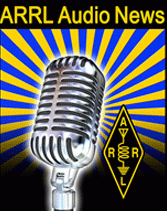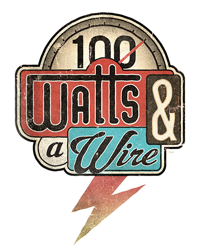There are several very good podcasts related to Amateur Radio. However, I have a limited time budget available for listening to these podcasts. Generally, I walk a half-hour five mornings a week giving me about 2.5 hours available when I’m walking. During the week there will be a couple of other times when I’m doing chores where listening to a podcast works. That comes up to around 3-4 hours maximum per week. As a result, I’ve settled onto these podcasts for my listening. I listen to them on my iPhone and have subscribed to them in iTunes so they automatically download whenever there is a new episode available.
 ARRL Audio News: “ARRL Audio News is a summary of the week’s top news stories in the world of Amateur Radio, hosted by Sean Kutzko, KX9X. Compiled from the ARRL Letter every Friday afternoon (except holidays), ARRL Audio News condenses the major Amateur Radio news highlights of the week into a fifteen-minute audio report.”
ARRL Audio News: “ARRL Audio News is a summary of the week’s top news stories in the world of Amateur Radio, hosted by Sean Kutzko, KX9X. Compiled from the ARRL Letter every Friday afternoon (except holidays), ARRL Audio News condenses the major Amateur Radio news highlights of the week into a fifteen-minute audio report.”
This podcast from the ARRL is generally published on Fridays and is usually less than 20 minutes in length. They often don’t publish a podcast in weeks where there is a holiday. The content is a subset of the ARRL Letter which is also published on a weekly basis. If one reads the ARRL Letter, then this podcast is somewhat redundant (but the Letter has a lot of information not included in the podcast). Since it is “news”, I try to listen to it soon after it is published. Past episodes lose their pertinence over time.
![]() ARRL The Doctor Is In: The Doctor podcast is published twice a month and consists of a back and forth exchange on a specific topic between ARRL Chief Editor Steve Ford (WB8IYM) and Joel Hallis (W1ZR). The episodes are generally about 20 minutes in length and are always very informative. Past episodes remain very pertinent and useful.
ARRL The Doctor Is In: The Doctor podcast is published twice a month and consists of a back and forth exchange on a specific topic between ARRL Chief Editor Steve Ford (WB8IYM) and Joel Hallis (W1ZR). The episodes are generally about 20 minutes in length and are always very informative. Past episodes remain very pertinent and useful.
![]() Amateur Radio Newsline: AR Newsline bills itself as “the first independent on-the-air news source for Amateur Radio”. The podcast is usually released every Friday and is generally twenty to thirty minutes in length. It is done in the style of a newscast with a number of reporters around the world reading and reporting on the events. The podcast is very informative and always has information about upcoming DX opportunities. Since it is “news”, I try to listen soon after it is released. Past episodes lose their value quickly after publication.
Amateur Radio Newsline: AR Newsline bills itself as “the first independent on-the-air news source for Amateur Radio”. The podcast is usually released every Friday and is generally twenty to thirty minutes in length. It is done in the style of a newscast with a number of reporters around the world reading and reporting on the events. The podcast is very informative and always has information about upcoming DX opportunities. Since it is “news”, I try to listen soon after it is released. Past episodes lose their value quickly after publication.
 Practical Amateur Radio Podcast: PARP is a production from Jerry Taylor in Colorado. I’ve enjoyed this podcast since the beginning. Occasionally the podcast goes on hiatus and then gets resurrected. Episodes currently come out on no specific schedule. They are usually about thirty to forty minutes in length. Past issues are useful. Jerry did a nice series on how to get licensed a couple of years ago.
Practical Amateur Radio Podcast: PARP is a production from Jerry Taylor in Colorado. I’ve enjoyed this podcast since the beginning. Occasionally the podcast goes on hiatus and then gets resurrected. Episodes currently come out on no specific schedule. They are usually about thirty to forty minutes in length. Past issues are useful. Jerry did a nice series on how to get licensed a couple of years ago.
QSO Today: Eric Guth (4Z1UG) publishes a weekly interview with an interesting person. That person may have made a significant contribution to Amateur Radio or just have an interesting story to tell. The episodes are quite entertaining and often contain useful information. Episodes are an hour or more in length. Past episodes are interesting and remain quite pertinent. This is a listener-sponored podcast and becoming a member by making a periodic or annual contribution gains access to a community and the ability to ask past guests questions and read their answers.
 100 Watts and a Wire: The podcast is usually recorded early on a Sunday morning and released on Mondays. Christian Cudnick (K0STH) ranges over a lot of topics in each podcast. He usually includes some information about some facet of the hobby. Christian has been in broadcasting for his entire career and presents an easy-t0-listen-to professional podcast. Past episodes aren’t always very pertinent. In addition to the podcast, Christian also runs a Facebook page which is quite active, and has regular “gatherings on the willing” nets on the air and on D-Star.
100 Watts and a Wire: The podcast is usually recorded early on a Sunday morning and released on Mondays. Christian Cudnick (K0STH) ranges over a lot of topics in each podcast. He usually includes some information about some facet of the hobby. Christian has been in broadcasting for his entire career and presents an easy-t0-listen-to professional podcast. Past episodes aren’t always very pertinent. In addition to the podcast, Christian also runs a Facebook page which is quite active, and has regular “gatherings on the willing” nets on the air and on D-Star.
 Ham Radio 360: This podcast has a unique format. Every other week the topic is a very technical “workbench” discussion run by George and Jeremy. These go into great depth and have been incredibly informative and educational. On the other weeks Cale Nelson (K4CDN) takes a look at various aspects of the hobby which often include interviews with experts on that topic. Past episodes are very useful. I’ve found this podcast to be a “must listen” every week.
Ham Radio 360: This podcast has a unique format. Every other week the topic is a very technical “workbench” discussion run by George and Jeremy. These go into great depth and have been incredibly informative and educational. On the other weeks Cale Nelson (K4CDN) takes a look at various aspects of the hobby which often include interviews with experts on that topic. Past episodes are very useful. I’ve found this podcast to be a “must listen” every week.